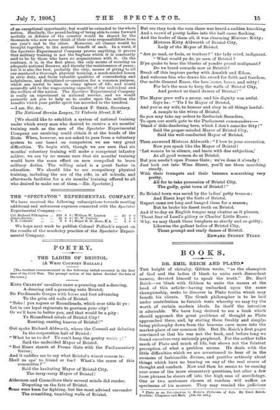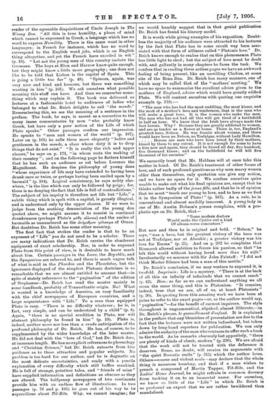BOOKS.
DR. BEM REICH AND PLATO.*
THE knight of chivalry, Gibbon wrote, "as the champion of God and the ladies (I blush to units such discordant names), devoted himself to speak the truth." Dr. Emil Reich—we blush with Gibbon to unite the names at the head of this article—having embarked upon the same championship, seeks to discover in Plato truths which may benefit his clients. The Greek philosopher is to be laid under contribution to furnish tests whereby we may try the worth of certain modern ideals. In itself the intention is admirable. We have long desired to see a book which should approach the great problems of thought as Plato approached them, and, by stating them freshly and simply, bring philosophy down from the heavens once more into the market-place of our common life. But Dr. Reich's first pages convinced us that his was not the book, and before long we found ourselves very seriously perplexed. For the author talks much of Plato and much of life, but shows not the faintest perception of what a problem means. He deals with the little difficulties which we are accustomed to hear of in the sermons of fashionable divines, and prattles artlessly about things which have no bearing on any of the real cruces of thought and conduct. Now and then he seems to be coming near some of the more elementary questions, but after a few loose phrases he sheers off into the high seas of anecdotage. One or two sentences chosen at random will suffice as specimens of his manner. They may remind the judicious • Plato as an Introduction to Modern Criticism of Life. By Emil Reich. London: Chapman and Hall. [10a. 6d. net.] reader of the agreeable disquisitions of Uncle Joseph in The Wrong Box. "All this is true humility, a phase of mind which cannot be expressed in Greek, a language which has no word to express Humility. There is the same want in other languages ; in French for instance, which has no word to correspond to the English word joke, which is an English
thing altogether, and yet the French have excelled in wit" (p. 10). "Let not the young men of this country imitate the Germans. The boys at Eton and Harrow know quite enough, but they might know a little more geography ; one does not like to be told that Lisbon is the capital of Spain. This is going a little too far" (p. 49). "Spinoza, again, was very nice and kind and humane, but there was something
wanting in him" (p. 101). We ask ourselves what possible meaning this stuff can have. And then we remember some-
thing which may explain it. The book was delivered as
lectures at a fashionable hotel to audiences of ladies who belonged to what Dr. Reich delights to call "the monde."
Remembering this, we see the meaning of a sentence in the preface. The book, he says, is meant as a corrective to the many inane commentaries by men "who probably know Greek, but have only a poor notion of the Life of which Plato speaks." Other passages confirm our impression. He speaks to "men and women of the world" (p. 107).
Later on (p. 161) he calls them more elegantly "ladies and
gentlemen in the monde, a class whose duty it is to drop things that do not exist." "It is really the rich and upper
classes," he says on p. 171, "in whom rests the making of their country " ; and on the following page he flatters himself that be has such an audience as sat before Lorenzo the
Magnificent. He despises the philosophy of young dons -"whose experience of life may have extended to having been drunk once or twice, or perhaps having been smiled upon by a barmaid" (p. 184). Logical consistency, he says nobly else- where, "is the line which can only be followed by prigs ; for, there is no denying the fact that life is full of contradictions." The subject of his inquiry is therefore not life but "Life," a subtle thing which is spelt with a capital, is grossly illogical, and is understood only by the upper classes. If we were to judge from the scathing denunciation of the young don quoted above, we might assume it to consist in continual drunkenness (perhaps Plato's pith allovtor) and the smiles of barmaids as unnumbered as the civipiepov yelacrisa of Ocean. But doubtless Dr. Reich has some other meaning.
The first fact that strikes the reader is that to be an exponent of "Life" you do not need to be a scholar. There are many indications that Dr. Reich carries the slenderest equipment of exact scholarship. Nor, in order to expound Plato from this point of view, is it desirable to know much about him. Certain passages in the Laws, the Republic, and the Symposium are referred to, and there is much vague talk of what is said in the Phaedon and the Theaetetus, but the ignorance displayed of the simplest Platonic doctrines is so remarkable that we are almost entitled to assume that—in spite of stately references to the " pagination " of the edition of Stepbanus—Dr. Reich has read the master mainly in some handbook, probably of Transatlantic origin. No! What is wanted is a knowledge of America, an easy familiarity with the chief newspapers of European countries, and a large acquaintance with "Life." To a man thus equipped Plato is easy. "There is no difficulty whatever; he is, in fact, very simple, and can be understood by a child" (p. 4). Again, "there is no special erudition in Plato, nor will abstract philosophy be found in him" (p. 19). Plato is, indeed, neither more nor less than a crude anticipation of the profound philosophy of Dr. Reich. He has, of course, to be supplemented by the wider knowledge of the later master. He did not deal with the "love of God," but Dr. Reich does, at immense length. He has no explicit references to phrenology and "Christian Science," but Dr. Reich extracts from him guidance as to these attractive and popular subjects. No problem is too hard for our author, and he is dogmatic on the most delicate uncertainties, and ready with a puerile explanation of every difficulty which still baffles mankind. He is full of strange, pointless tales, and "friends of mine" have supplied information and definitions as obscure as they are absurd. The halfpenny newspapers of two continents provide him with an endless flow of illustrations. In two passages (p. 76 and p. 195) be goes out of his way to be supercilious about Tit-Bits. Why, we cannot imagine ; for
we would humbly suggest that in that genial publication Dr. Reich has found his literary model.
It is worth while giving examples of his exposition. Doubt- less the majority of his audience were attracted to his lectures by the fact that Plato has in some occult way been asso- ciated with that form of silliness called "Platonic love." . Dr.
Reich knows enough to realise that on this phenomenon Plato has little light to shed ; but the subject of love must be dealt
with, and gallantly in many chapters he faces the task. We confess that in reading these artless pages we have an awkward feeling of being present, like an unwilling Clodius, at some rite of the Bona Dea. Dr. Reich has many manners, one of which may be called that of the "mothers' meeting." We
have no space to summarise the excellent advice given to the mothers of England, advice which would have greatly edified Plato. We will content ourselves with quoting one exquisite example (p. 119):—
" The man who has had the most cuddling, the most kisses, and the most of a mother's love and tenderness, that is the man who will make a great hero. It is the women who make the men. The man who has not had all this will get tired of a battlefield in half an hour. We know that the Irish have always made the best heroes. Why P Because they are greatly addicted to women, and are as tender as a flower at home. There is, too, England's greatest hero, Nelson. He was frantic about woman, and there would have been no Nelson, no Trafalgar, without Lady Hamilton. Heroes are men who have been loved by their mothers, kissed by them to any extent. It is not enough for some to have a kiss now and again, they should be kissed all day, five hundred, five thousand kisses ; and on the battlefield he will kill five thousand of his enemies."
We earnestly trust that Mr. Haldane will at once take this matter in band. Of Dr. Reich's treatment of other forms of love, and of such profound questions as why men marry women older than themselves, only quotation can give any notion, and we have no space for it. We confess ourselves quite
unable to make out what his final opinions are, except that he thinks rather badly of the jeans fille, and that he is of opinion that we must "teach our young to love, and to love as we find it in the Symposium of Plato !" (p. 167). As a rule, he is zonventional and almost sordidly innocent. A young lady in one of Mr. Austin Dobson's poems complains, with a pro- phetic eye on Dr. Reich, that- " Some modern doctors
Would make the Cynics out a kind Of album-verse concoctors."
But now and then he is original and bold. "Nelson," he says, "was a hero, but the greatest victory of the hero was not at Trafalgar, nor at Aboukir ; a greater victory was his
love for Emma" (p. 25). And on p. 282 he complains that
Bismarck allowed ambition to freeze his passion, no that "he left this world without having loved more than his wife." Iiivoluntarily we murmur with Sir John Falstaff : "I did not think Master Silence had been a man of this mettle."
Dr. Reich's conclusion, if we may venture to expound it, is twofold. Imprimis : Life is a mystery. "There is at the back of all this an infinity of infinitude that we cannot reach" (p. 42), Item : so far as we can understand anything we all
mean the same thing, and this is Platonism. "It remains, indeed, true that we are, all of us, at heart Platonists "
(p. 30). In quoting from this amazing work we have been at pains to refer to the exact pages—or, as the author would say, "pagination "—for the benefit of earnest inquirers. The style throughout is ungrammatical, slipshod, almost illiterate,—in Dr. Reich's phrase, le gazouillement d'enfant. It is explained
in the preface that any blemishes of presentation are due to the fact that the lectures were not written beforehand, but taken down by long-hand reporters for publication. We can only admire the audacity of the man who ventures to offer such a book to the world. As lie remarks obscurely but appositely, "there are plenty of kinds of cheek, modern" (p. 230). We are afraid that the work will not be treated with the deference it deserves. Some, no doubt, will receive its arguments with "the quiet Socratic mile" (p. 215) which the author loves.
Others—coarse and violent souls—may declare that the whole thing is nauseous humbug, and that if a man wishes to
preach a compound of Martin Tupper, Tit-Bits, and the Ladies' Home Journal, he might refrain in common decency
from tacking it on to an immortal name. For ourselves, we know so little of the " Life " in which Dr. Reich is so profound an expert that we are rather bewildered than scandalised.



















































 Previous page
Previous page